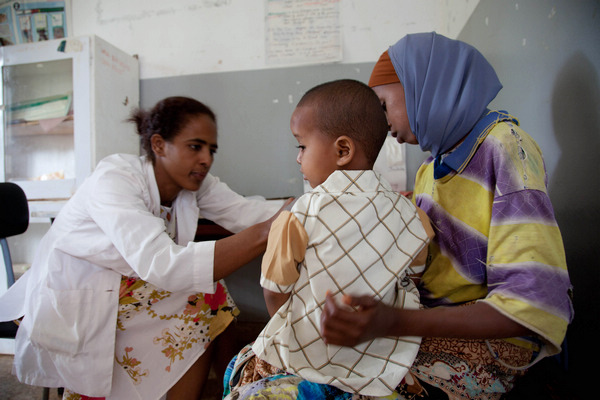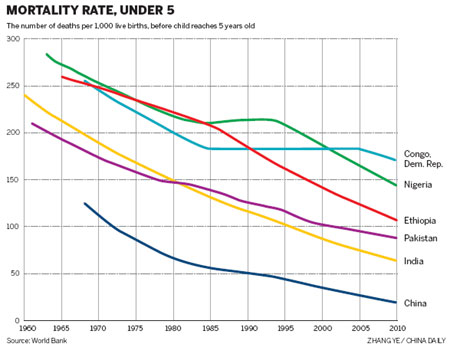Progress made on reducing child mortality
Updated: 2012-06-14 08:08
By D. J. Clark (China Daily)
|
|||||||||||
Pneumonia and diarrhea are the two leading causes of infant mortality, together accounting for nearly one-third of all deaths among children under 5 around the world. This amounts to more than 2 million lives lost each year. Both diseases are easily preventable and curable, a new United Nations Children's Fund report says.
"Deaths from diarrhea and pneumonia are concentrated in the world's poorest regions and countries and occur among the poorest children within these societies," said Tessa Wardlaw, associate director of monitoring and statistics at UNICEF, quoting from the data-driven report.
|
 |
|
A doctor examines a child at the Babile health center in northern Ethiopia in July 2011. D. J. Clark / China Daily |
If the 75 countries with the highest mortality under age 5 gave the poorest infants the same protection and access to medicines as the richest children in their countries, an estimated 2 million lives could be saved over the next three years, the report says.
"So scaling up key interventions would not only reduce the child survival gap between the poorest and richest children but would also accelerate the progress toward eliminating preventable child deaths," Wardlaw said.
In a telephone interview from Addis Ababa, the director of UNICEF's health program in Ethiopia, Lu Wei, a Chinese doctor from Beijing, explained why concentrating on these two diseases was the easiest way to reduce child deaths.
|
 |
"Ethiopia's biggest chance to be successful is to scale up community based care at the health post level. In Ethiopia, there are 34,000 rural health extension workers working throughout some 15,000 health posts," Lu said. Ethiopia is among the top five countries listed in the report along with India, Nigeria, Democratic Republic of Congo and Pakistan that make up more than 50 percent of global child deaths by diarrhea and pneumonia.
"Supporting the government to train the health extension workers to treat pneumonia and diarrhea will certainly bring down the mortality from these two diseases," Lu added.
Optimal breast-feeding, adequate nutrition, vaccination, hand washing with soap, providing safe access to drinking water and basic sanitation are key to preventing the diseases but often missing from the poorest communities. Treating diarrhea with oral rehydration salts and zinc, and pneumonia with antibiotics, are simple and effective ways to deal with the diseases but are not always accessible by the world's most needy children.
The report comes at the start of a final campaign to meet the United Nations millennium development goal to reduce the under-5 child mortality rate by two-thirds by 2015. It's a goal that is within reach for many countries including China, which ranks seventh in the list of countries with the most under-5 deaths from the two diseases.
Although the mortality rate of children under 5 in China has decreased by 73 percent since 1991, there are still nearly 300,000 child deaths a year, according to The Report on Women and Children's Health Development released by the Ministry of Health last year. Fourteen percent die from pneumonia and 3 percent from diarrhea.
"If you look at the mortality rate of infants after the first few months and before 1 year of age, then it is almost 50 percent of the children that die of pneumonia," said Robert Scherpbier, chief of health, nutrition, water, environment and sanitation in the UNICEF office in China. "Pneumonia is an incredibly important program in China that needs to receive more attention."
The issue of inequality of healthcare outlined in the UNICEF report is also relevant in China. "In Shanghai the under-5 mortality is five per 1,000 live births and in Sichuan province the under-5 mortality is eight times higher. It's almost 40 per 1,000 live births so that's a huge difference," Scherpbier said.
"China is putting a lot of emphasis on trying to make these inequalities disappear. The central government does that by funding and subsidizing health programs in the western regions much more than it funds health programs in the east and that is a really good way of making sure these inequalities disappear."
China has much to offer the outside world, too, in the fight to reduce infant mortality. Deaths due to pneumonia and diarrhea dropped by 70 percent between 1996 and 2006 according to a study published in the Journal Public Health last year, which alone has provided a crucial boost in reaching the millennium goal.
"If China focuses that effort on the issues of pneumonia and diarrhea, China could be a global leader in showing what it means if you invest in the poorer parts of the population," Scherpbier said.
Chinese pharmaceutical companies also hope to play a role in the long term, by supplying antibiotics, vaccines and oral rehydration salts at a reduced cost to help combat the diseases. This, Scherpbier predicts, will start to happen in the next few years once the companies obtain licenses from the World Health Organization.
There is much work to be done over the next three years if the millennium goal is to be reached by 2015. "This report is an urgent call to action to reduce child deaths due to these leading causes. We are calling for global action on behalf of the most vulnerable children," Wardlaw said.
A meeting convened by Ethiopia, India and the United States, with 700 global leaders from government, the private sector and civil society, will start in Washington on Thursday to kick start the push.
djclark@chinadaily.com.cn
Today's Top News
President Xi confident in recovery from quake
H7N9 update: 104 cases, 21 deaths
Telecom workers restore links
Coal mine blast kills 18 in Jilin
Intl scholarship puts China on the map
More bird flu patients discharged
Gold loses sheen, but still a safe bet
US 'turns blind eye to human rights'
Hot Topics
Lunar probe , China growth forecasts, Emission rules get tougher, China seen through 'colored lens', International board,
Editor's Picks

|

|

|

|

|

|





